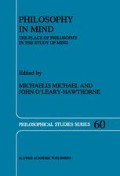Abstract
What role if any is there for conceptual analysis in metaphysics? On the face of it, very little. Metaphysics is to do with what is in the world and what it is like, not with concepts and semantics.1 We would expect science in the wide sense to be highly relevant, but not the armchair deliberations of the philosopher concerned with the analysis of concepts. However, traditionally metaphysicians have paid at least as much attention to questions of conceptual analysis, and to related questions of logical interconnections (to what entails or fails to entail what) as they have to what science tells us about the world. David Armstrong, for example, while rightly and famously insisting that what is said in the philosophy of mind must be answerable to what science tells us about the role of the brain in the causation of behaviour, spends most of A Materialist Theory of the Mind (1968) doing conceptual analysis.2 It is understandable that recently many philosophers writing under the banner of ‘naturalism’ have declared the traditional preoccupations of metaphysicians with such armchair matters as conceptual analysis and entailments to be a mistake.
Access this chapter
Tax calculation will be finalised at checkout
Purchases are for personal use only
Preview
Unable to display preview. Download preview PDF.
References
Armstrong, D.M. (1968), A Materialist Theory of the Mind (London, Routledge&Kegan Paul).
Armstrong, D.M. (1989), A Combinatorial Theory of Possibility (Cambridge: Cambridge University Press).
Blackburn, S. (1984), Spreading the Word (Oxford: Oxford University Press).
Davies, M.K.& Humberstone, I. L. (1980),‘Two Notions of Necessity’, Philosophical Studies 38, pp. 1–30.
Devitt, M. (1984), Realism and Truth (Oxford: Basil Blackwell).
Forrest, P. (1986),‘Ways Worlds Could Be’, Australasian Journal of Philosophy, 64, pp. 15–24.
Forrest, P. (1992),‘Universal and Universalizability’, Australasian Journal of Philosophy, 70, pp. 93–98.
Hick, J. (1964),‘The Doctrine of the Resurrection of the Body Reconsidered’, in Antony Flew (ed.), Body, Mind and Death (New York: MacMillan).
Horgan, T. (1982), Supervenience and Microphysics’, Pacific Philosophical Quarterly, 63, pp.29–43.
Kripke, S. (1980), Naming and Necessity (Oxford, Basil Blackwell).
Lewis, D. (1983),‘New Work for a Theory of Universels’, Australasian Journal of Philosophy, 61, pp. 343–377.
Lewis, D. (1986), On the Plurality of Worlds (Oxford, Basil Blackwell).
Putnam, H. (1975),‘The meaning of “Meaning”’in his Mind, Language and Reality (Cambridge, Cambridge University Press), pp. 215–271.
Sterelny, K. (1990), The Representational Theory of Mind (Oxford: Blackwell).
Stalnaker, R. (1976), ‘Possible Worlds’, Nous, 10, pp. 65–75.
Stamaker, R. (1978),‘Assertion’in P. Cole (ed.), Syntax and Semantics, Vol.9 (New York: Academic Press), pp. 315–332.
Stalnaker, R. (1984), Inquiry (Mass., MIT Press).
Tichy, P. (1983),‘Kripke on Necessity A Posteriori’, Philosophical Studies, 43, pp. 225–241.
Williams, D.C. (1966), Principles of Empirical Realism (Springfield, Ill.: Thomas).
Yablo, S. (1992),‘Mental Causation’, Philosophical Review, 101, 2, April, pp. 245–280.
Editor information
Editors and Affiliations
Rights and permissions
Copyright information
© 1994 Springer Science+Business Media Dordrecht
About this chapter
Cite this chapter
Jackson, F. (1994). Armchair Metaphysics. In: Michael, M., O’Leary-Hawthorne, J. (eds) Philosophy in Mind. Philosophical Studies Series, vol 60. Springer, Dordrecht. https://doi.org/10.1007/978-94-011-1008-2_3
Download citation
DOI: https://doi.org/10.1007/978-94-011-1008-2_3
Publisher Name: Springer, Dordrecht
Print ISBN: 978-94-010-4438-7
Online ISBN: 978-94-011-1008-2
eBook Packages: Springer Book Archive

